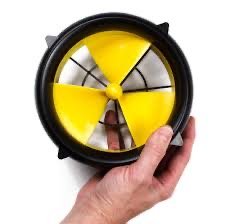OFF-GRID MICRO WATER TURBINES
Image courtesy of Flaticon
Water turbines use the sustainable kinetic energyof flowing water, generated by gravity, to impact a blade or propeller that rotates a main shaft of a turbine to produce direct current (DC) electricity.
There are several types of water turbines as shown above. Water production is measured in terms of hydraulic head and flow. The greater each one, the more hydraulic power available. According to Wikipedia, the “hydraulic head is the pressure measurement of water falling in a pipe expressed as a function of the vertical distance the water falls.” “Flow is the actual quantity of water falling from a site and is usually measured in gallons per minute, cubic feet per second, or liters per second.
Image courtesy of Linkedin
Whichever water turbine you choose will depend on the water source and how environmentally friendly the water turbine is to aquatic wildlife. For instance, on a large scale, an Archimedean model has a slow rotational speed and the large dimensions of the hydro turbine screw facilitates the safe passage of fish and other aquatic wildlife downstream. However, this type of water turbine will require the creation of a dam to funnel the flow of water into the water turbine.
For purposes of the Tiny Off-Grid House Research, a dam may not be necessary and definitely will not be an option if the waterway is a migratory route for fish, like Salmon, or an aquatic nursery. The protection of aquatic life and preservation of natural habitats should be paramount when attempting to harness hydroelectricity from water sources. The migratory path of aquatic creatures should not be blocked and the spawning cycle of aquatic animals should not be interrupted.
The more portable, low water pressure, models of micro water turbines do not require the creation of a dam or funnel. The compact water turbine can simply be anchored along the waters edge or water fall without disrupting the migratory route of aquatic creatures or their environment. This form of water turbine is ideal for an off-grid Tiny House.
The WaterLily is a portable micro water turbine that can charge small electronic devices or power packs using a convenient 10ft (3m) 2.0 USB charging cord.
Image courtesy of WaterLily
The WaterLily has an output of 5V DC, up to 3A, 15W. The maximum water flow required is 0.7 mph (1 km/h, 0.5 kt) while the maximum water speed required is 9 mph (15 km/h, 8 kt). As a bonus, a conversion kit allows for modifications in the field transforming the WaterLily in to the WindLily wind turbine.
WATERLILLY CONS
Water source devoid of ice
May not be suitable for ocean currents
Low power generation
Debris in water may clog turbine blades
WATERLILLY PROS
Passive renewable hydro energy generation
Operational day & night
Portability
Does not require a dam or funnel
Convertible to a wind turbine
Low impact to aquatic life
Please share your thoughts or experiences in the Comments section below.


